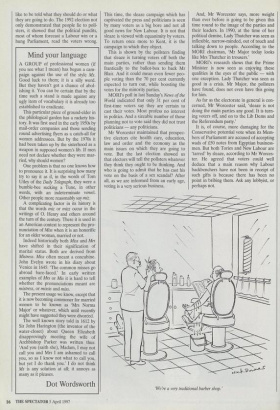Mind your language
A GROUP of professional women (if you see what I mean) has begun a cam- paign against the use of the style Ms. Good luck to them; it is a silly word. But they haven't got a chance of abol- ishing it. You can be certain that by the time such a stand is made against any ugly item of vocabulary it is already too established to eradicate.
This particular piece of ground-elder in the philological garden has a rackety his- tory. It was first used in the early 1950s by mail-order companies and those sending round advertising flyers as a catch-all for women addressees. But by the 1970s it had been taken up by the sisterhood as a weapon in supposed women's lib. If men need not declare whether they were mar- ried, why should women?
One problem is that no one knows how to pronounce it. It is surprising how many try to say it as if, in the words of Tom Utley of the Daily Telegraph, they were a bumble-bee sucking a Tune, in other words, with an indeterminate vowel. Other people more reasonably say miz.
A complicating factor in its history is that the words miz or mizz occur in the writings of 0. Henry and others around the turn of the century. There it is used in an American context to represent the pro- nunciation of Miss when it is an honorific for an older woman, married or not.
Indeed historically both Miss and Mrs have shifted in their signification of marital status. Both are derived from Mistress. Miss often meant a concubine. John Evelyn wrote in his diary about Venice in 1645: 'The common misses go abroad bare-faced.' In early written examples of Mrs or Mis it is hard to tell whether the pronunciations meant are mistress, or missis and miss.
The present usage we know, except that it is now becoming commoner for married women to be known as 'Mrs Norma Major' or whatever, which until recently might have suggested they were divorced.
The well known story told in 1612 by Sir John Harington (the inventor of the water-closet) about Queen Elizabeth disapprovingly meeting the wife of Archbishop Parker was written thus: `And you (saith she), Madam, I may not call you and Mrs I am ashamed to call you, so as I know not what to call you, but yet I do thank you.' I do not think Ms is any solution at all; it annoys as many as it pleases.
Dot Wordsworth


























































 Previous page
Previous page